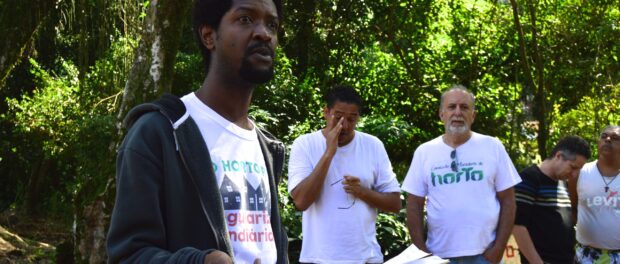
Housing rights groups had hoped that the arrival of the Olympic Games would bring an end to the painful and extraordinary period of forced evictions Rio has experienced since the city was selected to host the Games, back in October 2009.
Yet a federal court announced on Wednesday, August 10, that Rio’s Botanical Garden will have 90 days to remove the Horto favela in the South Zone of Rio de Janeiro, striking a blow to the longstanding effort to secure the community’s permanence. The Federal Court of Accounts (TCU) established the time period against the advice of experts, who suggested a minimum of 180 days to complete the process. As of last week the Botanical Garden had promised no compensation to residents set to lose their homes, despite the objections of Minister Bruno Dantas, who contended that the evictions should not take place before a compensation agreement is met.
Horto, a community of 621 families, was founded 200 years ago when King João VI invited workers building the Botanical Garden to live on the adjacent property. Generations of Botanical Garden employees have lived in Horto, many of whom received housing in lieu of monetary compensation. The community has faced several removal efforts by the governing committee of the Botanical Garden, with evictions threats dating back to the 1960s.
Last week’s announcement comes after a prolonged period of uncertainty following the suspension of President Dilma Rousseff. Over 200 families filed lawsuits against the Botanical Garden, a national park, for serving eviction notices earlier this year. A series of demonstrations in March drew hundreds of residents and supporters to protest the eviction of several elderly residents that was later postponed. The case has been in litigation in Brasília for months, but was delayed by the political turmoil in the federal government. Residents considered President Rousseff’s administration to be their best chance to resist removal, as the government had been actively supporting the community’s efforts.
Following the installation of interim President Temer, Horto Neighborhood Association President Emerson de Souza reported that residents had difficulty contacting representatives in the Temer administration regarding their case. Representatives from the Botanical Garden have refused to communicate directly with residents, opting instead to deliver eviction notices and updates through armed shock troops.
While the Botanical Garden claims to need the land to expand its research institute, residents contend they are being forced out due to real estate speculation. The community abuts the growing Jardim Botânico neighborhood, a chic district peppered with gated condominiums and expensive bistros as well as media giant Globo’s headquarters. Residents of Horto have frequently criticized Globo for what they perceive as a vested interest in the community’s removal. Globo has reported Horto’s property as being worth R$10.6 billion and characterized the community in a recent headline as an “irregular occupation.” A number of Globo executives, including Grupo Globo vice president José Roberto Marinho, serve on the Friends of the Botanical Garden Association.
Residents, however, refute the narrative of “invasion” and emphasize their strong, historic connection with the land. Neuza Carcerere, 65, was born and raised in Horto and explained: “For me, the value of this land is not monetary. The value of this land for the people here is the history and the community.”

According to Emilia de Souza, former president of the Neighborhood Association, Horto’s struggle to resist removal began after Globo built their offices in the neighborhood. “They aroused the interest of real estate developers and transformed the neighborhood into a highly valued area, and soon thereafter labeled longtime residents as invaders,” she explained. Pointing to mansions built on the nearby hillside, de Souza commented that while those houses circumvented the strict zoning ordinances in the Tijuca National Park they have never been described as “illegal” or “occupations” by Globo. “These laws only apply to the working class,” she said.
Residents argued that delivering the eviction notice during the Olympics was an attempt to evade media coverage. In a statement released online, the Neighborhood Association wrote, “We are not against the Olympics, much to the contrary, we are against the dismantling of constitutional rights of the working class. While everyone is focused on competition for medals, the government is violating our fundamental rights.”
